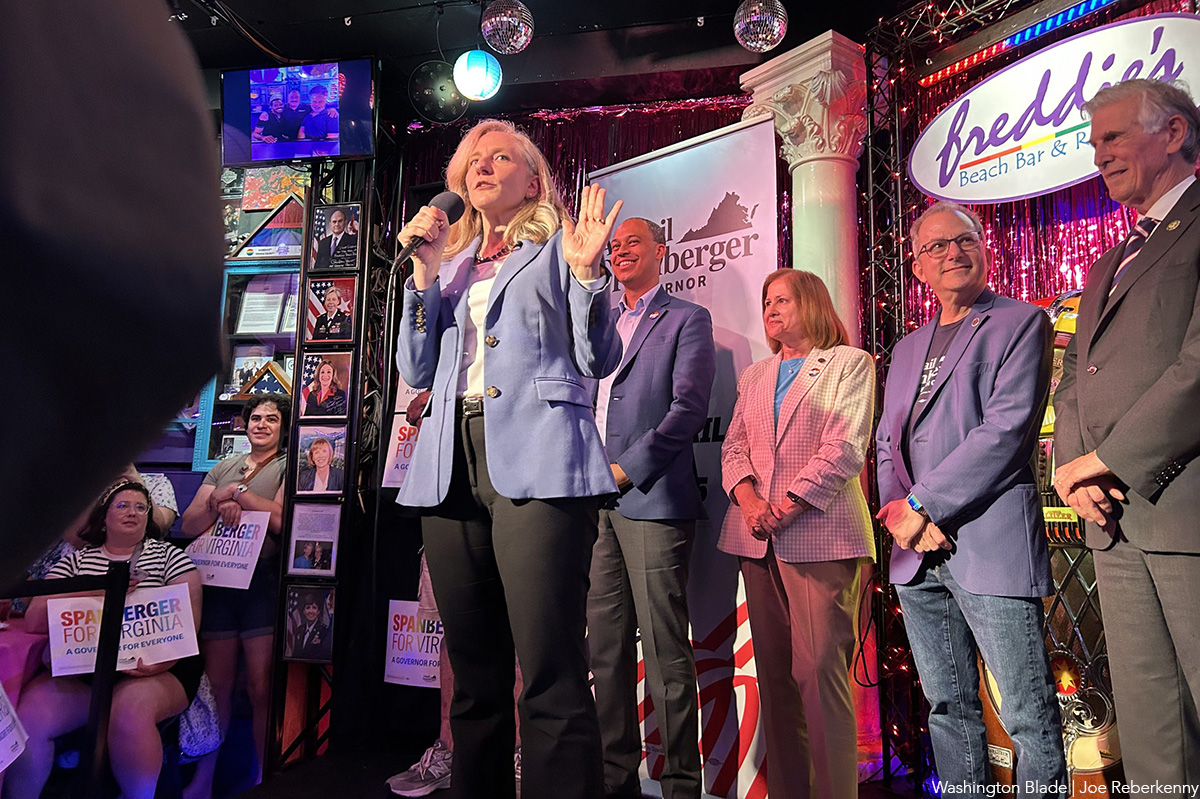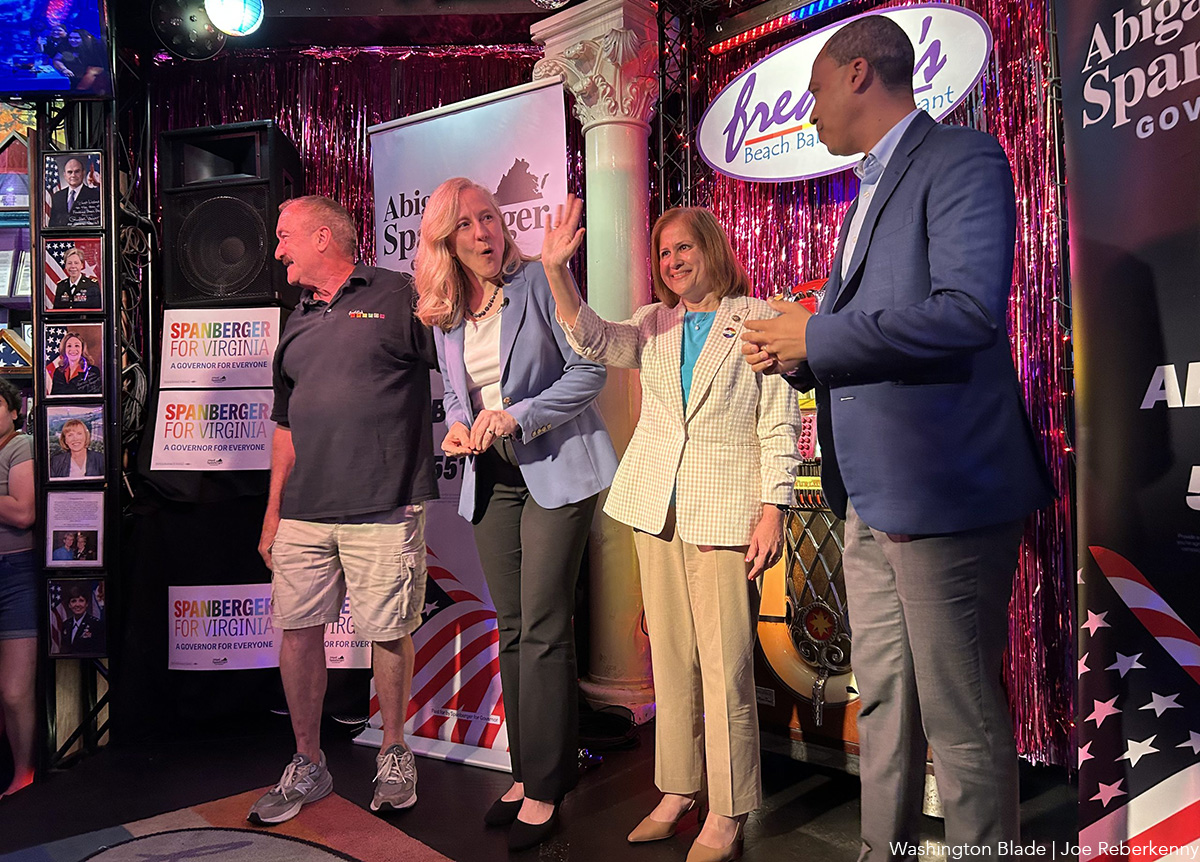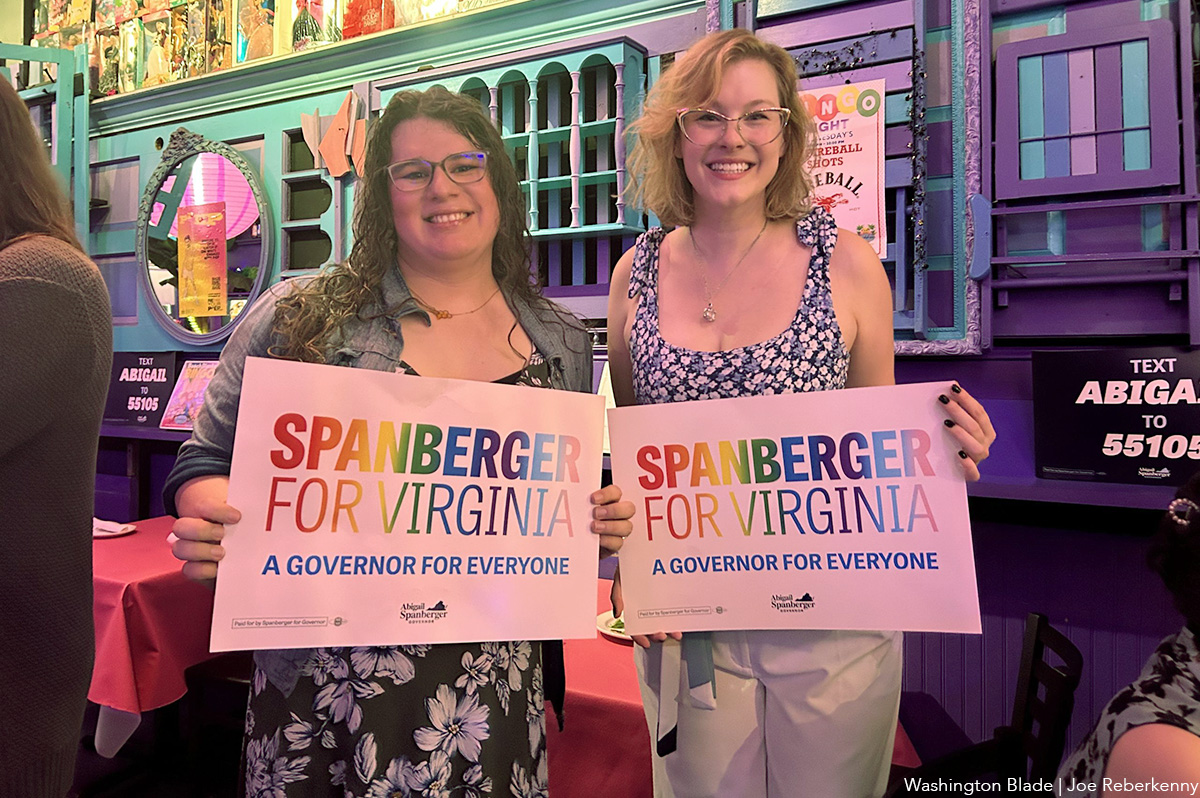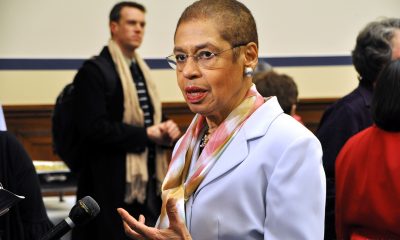Local
'Today was like a dream'
Couples, D.C. officials celebrate arrival of same-sex marriage
(DC Agenda video by Steve Fox)
Under the watchful eye of nearly two dozen television cameras and news photographers, three same-sex couples took their wedding vows Tuesday morning before about 150 guests at a ceremony held less than a mile from the White House.
The weddings, held at the Human Rights Campaign headquarters, were among the first to take place after the city’s same-sex marriage law took effect last week.
D.C. residents Angelisa Young, 47, and Sinjoyla Townsend, 41, who have been a couple for 12 years, were the first to say “I do” after exchanging rings before a barrage of clicking cameras.
“Today was like a dream for me,” Young said after the ceremony. “I always felt like it would come true. But it’s here now, and it’s really real, we want to thank everyone who made this possible.”
Next to exchange their wedding vows at the ceremony were Reginald Stanley and Rocky Galloway, both 50. As Rev. Sylvia Sumter performed the wedding, the couples’ two 16-month-old daughters watched with interest as they were held in the arms of two adult family members just a few feet away.
The last of the three couples to marry during the HRC ceremony were Rev. Elder Darlene Garner and Rev. Lorilyn Candy Holmes, members of the Metropolitan Community Church of Washington, which has a mostly gay congregation. Rev. Dwayne Johnson, pastor of the church, performed the marriage.
“Today, the love you have is recognized by the District of Columbia,” Johnson said. “I now declare you legally married.”
HRC Vice President David Smith said the building’s first-floor meeting hall, which the group calls the Equality Forum, has been host to numerous same-sex commitment ceremonies in the past and the group was delighted to provide its facility for one of the first same-sex marriages in the District.
But while the three weddings at the HRC building drew most of the media spotlight, two other same-sex weddings Tuesday morning held at the D.C. Superior Court building are believed to have been the first such marriages to take place under the city’s Religious Freedom & Marriage Equality Amendment Act.
District residents Jeremy Moon, 31, and Bryan Legaspi, 30, both of whom work in the Obama administration, wed shortly after the court opened at 8:30 a.m. in a courtroom ceremony performed by Judge Brook Hedge.
At the same time, D.C. residents Robb Hawthorne, 24, and James Betz, 23, were married on a plaza outside the courthouse by Rev. Bonnie Berger. Hawthorne and Betz, who met while they were students at George Washington University, both work at the university’s affiliated clinic, Medical Faculty Associates.
Hawthorne said the two met Berger through her role as a chaplain at George Washington University Hospital.
“We arrived at the courthouse at 3:30 in the morning to get in line,” Hawthorne said, noting that the couple wanted to be among the first to pick up their marriage licenses.
The city’s existing marriage law requires a waiting period of three business days between the time people apply for a marriage license and the time it is issued by the court. More than 200 same-sex couples applied for marriage licenses beginning March 3, when the same-sex marriage law took effect, through March 5, according to a court spokesperson. Tuesday was the first day same-sex marriages could be performed.
Among the people attending the ceremony at the HRC building were D.C. Council members David Catania (I-At Large), who wrote and took the lead role in advancing the same-sex marriage bill, and Jim Graham (D-Ward 1), a long-time supporter of same-sex marriage rights. Both are gay.
The two were joined after the ceremony by D.C. Mayor Adrian Fenty, who stood alongside the newly married couples to congratulate them and talk to reporters. Fenty signed the marriage bill shortly after the City Council passed it 11-2 in December.
“It’s tough to represent a city,” he told the couples. “It’s tough to represent a community, and it’s also tough to represent a nation. But the six of you today do that. Whether you realize it or not, whether you like it or not, you represent what this entire country is about.”
Fenty added, “As mayor of the District of Columbia, I cannot be more excited or proud to be here. I think this is not only a great step forward for all six of you, but…it is also great step forward for equality in general, for our great city…and for our great country.”
Catania, who called the ceremonies “incredibly moving,” drew nods of approval when he compared them in at least one respect to most other weddings.
“Council member Graham said we all cry at weddings and that was especially true today,” Catania said. “This is one of the most profoundly rewarding experiences I’ve ever had the privilege of being a part of.”
Catania and Graham said they never thought they would see same-sex marriage happen in their lifetime.
“There’s been no event in my life that has been more uplifting, more positive, more affirming than these three marriages this morning,” Graham said, “because it says so much about human dignity, about valuing each other or who they are and nothing less — nothing short of that.”
Also attending the ceremony and participating in the press conference was veteran D.C. gay activist Frank Kameny, who is credited with founding the city’s LGBT rights movement.
“This represents a major victory, one that has been in the making for 35 to 40 years, although back then we never remotely thought it would really come to pass,” Kameny said. “And hopefully it sets the tone for other victories. This is not the last that we need. There are others that are in the making, and we’re going to have to continue working on those and hopefully with equal success in the very near future.”
The ceremonies at the HRC building were sponsored by the Campaign for All D.C. Families and D.C. Clergy United for Marriage Equality, two groups that were part of a coalition of gay and straight organizations that lobbied for the same-sex marriage bill.
Rick Imirowicz, 43, and Terrance Heath, 41, both District residents and a couple for ten years, were married Tuesday afternoon at All Souls Unitarian Church in Northwest D.C. Rev. Robert Hardies, pastor of the church, performed the ceremony.
Maryland
Silver Spring holds annual Pride In The Plaza
‘Today means inclusion. It means to build resilience’

Silver Spring’s annual Pride in the Plaza event took place on Sunday to celebrate the LGBTQ community and emphasize inclusion and resilience.
“Today means inclusion. It means to build resilience, love,” Robyn Woods, program and outreach director for Live In Your Truth, which organized the event, said. “I mean, just being surrounded by the community and so many great entrepreneurs, business owners, and just being a part of this whole rainbow coalition that we call the LGBTQIA to be about.”
With the event being her first time organizing for Live In Your Truth, Woods said she felt emotional to see the support and love at the event.
“Some people (are) bringing out their children, their babies, their grandparents,” Woods said. “It’s a lot more allies here than anything else. That type of support to me means so much more than just support from my community; just outside support, inside support, so much support around it, so much love. Everyone’s smiling outside, helping each other.”
Attendees of the event were able to head over to the Family Fun Zone, an air-conditioned Pride Cool Down Lounge, or watch live drag performances in the main stage area.
Along with entertainment and a shaved-ice stand, rows of information tables stood along the plaza, including FreeState Justice, the Washington Spirit, Trans Maryland, Moco Pride Center, and the Heartwood Program, an organization that offers support, therapy, education, and resources to the LGBTQ community.
“I want people to know about our services, and I love what we have to offer,” Jessica Simon, psychotherapist for Heartwood Program’s Gender Wellness Clinic, said. “I (also) want to be part of a celebration with the community, and so it feels good to be here with other people who have something they want to give to the community.”
She added that within today’s political climate, to which she called an “antidote to shame,” it’s important to be celebrating Pride.
“There’s a lot of demonization of LGBTQI people,” Siena Iacuvazzi, facilitator for Maryland Trans Unity, said. “(Pride) is part of the healing process.”
Iacuvazzi said she was taught to be ashamed of who she was growing up, but being a part of a community helped her flourish in the future.
“I was taught how to hate myself. I was taught that I was an abomination to God,” she said. “But being a community is like understanding that there are people who have experienced the same thing, and they’re flourishing. They’re flourishing because they’re willing to stand up for themselves as human beings and discover themselves and understand what’s true for themselves.”
She added that Pride allows for a mutual understanding to take place.
“It’s more of a sense of belonging … and just taking that home and understanding you’re not alone,” Iacuvazzi said. “We’re each taking our own journey — we’re not putting that on each other. It’s just walking away with a sense of belonging and humanity.”
Similar to Iacuvazzi, Woods said she hopes attendees’ biggest takeaways would be family, fun, resilience, and pride.
“Being proud of yourself, being happy for who you are, and representation and how much it matters,” she continued. “And I think all these young people that are walking around here get to see versions of themselves, but older. They get to see so many different lesbian, gay, bisexual, pansexual people that are successful, that are showing love, that care, and it’s not how we’re portrayed in the media. It’s lovely to see it out here. (It’s) like we’re one big old, happy family.”
Virginia
Spanberger touts equality, reproductive rights in Arlington
Democratic Va. gubernatorial nominee made campaign stop at Freddie’s Beach Bar

With the general election heating up and LGBTQ rights under increasing threat nationwide, Virginia gubernatorial candidate Abigail Spanberger brought her “Span Virginia Bus Tour” to Arlington’s Freddie’s Beach Bar for a campaign stop filled with cheers, policy pledges, and community spirit.
Spanberger, who served three terms in the U.S. House of Representatives from 2019 through early 2025 for Virginia’s 7th Congressional District, also served as a federal law enforcement officer specializing in narcotics and money laundering cases, and as a CIA case officer working on counterterrorism and nuclear counterproliferation.
Spanberger is running against Republican nominee Winsome Earle-Sears, the current lieutenant governor of Virginia, who said she was “morally opposed” to a bill protecting marriage equality in the commonwealth.
She was joined by other Democratic candidates and supporters: lieutenant gubernatorial candidate Ghazala Hashmi, attorney general candidate Jay Jones, Virginia state Sen. Adam Ebbin (D-Alexandria), and Congressman Don Beyer.

Freddie’s was packed wall-to-wall with supporters, many of whom wore “Spanberger for Virginia” shirts in the progressive Pride flag colors. In her speech, she made it clear that LGBTQ Virginians’ rights are on the ballot this year.
“I’m so excited to be here, and I am so grateful to the entire staff of Freddy’s for letting us overtake this incredible venue that is not just an awesome place to come together in community, but is a symbol to so many people of joy, of happiness, of community and of celebrating our friends and our neighbors,” Spanberger told the packed restaurant. “It is exciting to be here, and particularly during this Pride month, and particularly as we reflect on the 10-year anniversary of Obergefell and the reality that we still have so much work to do.”
“The reality is there are so many people who still would be inclined to take us backwards,” she said. “In this moment when we see attacks on people’s rights, on people’s humanity, on Virginia, on our economy, on research, on public education, on food security, on health care, on Virginians, on their jobs, on public service and on people — it can get heavy.”
“What it does for me is it makes me want to double down, because once upon a time, when I was talking to my mother about some horror show or sequence of activities coming out of a particular administration, she did not really have the patience to listen to me and said ‘Abigail, let your rage fuel you’ — and the conversation was over. And so I reflect on that, because, in fact, every day there is so much fuel to be had in this world and in this moment.”
One of the points Spanberger continued to emphasize was the importance of steadfast state government officials following the election of President Donald Trump, which has led to rollbacks of LGBTQ and bodily autonomy rights as a result of the conservative-majority U.S. Supreme Court.
“What the past few years have shown us is that a Supreme Court decision, no matter how many years we have celebrated its existence, does not protect us in the long term. And so as governor, I will work to make sure that every protection we can put in place for the dignity, the value, and the equal rights of all Virginians is a priority.”
During her speech, Spanberger highlighted several of the key values driving her campaign — protecting reproductive freedom and human rights, lowering healthcare costs, safeguarding Virginia’s environment, and ensuring that public education is affordable, accessible, and rooted in truth, not politics.
Spanberger went as far as to say that she wants to amend the state’s constitution to remove Section 15-A. “The reality is that in Virginia, we still have a ban in our state constitution on marriage equality. It is of the utmost urgency that we move forward with our constitutional amendment.”
“We will work to ensure that that terrible constitutional amendment, that was put in years ago, is taken out and updated and ensuring that Virginia is reflective in our most essential documents of who we are as a commonwealth, which is an accepting place that celebrates the vibrancy of every single person and recognizes that all Virginians have a place, both in that constitution and in law,” she added.
Following the event, two supporters spoke to the Washington Blade about why they had come out to support Spanberger.
“I came out because I needed to show support for this ticket, because it has been a particularly rough week, but a long few years for our rights in this country, in this state, with this governor, and it’s — we need to flip it around, because queer people need protection,” said Samantha Perez, who lives in Ballston. “Trans people need protection. Trans kids need protection. And it’s not gonna happen with who’s in Richmond right now, and we just need to get it turned around.”

“The whole neighborhood’s here. All our friends are here,” said Annie Styles of Pentagon City. “It means the world to me to take care of each other. That’s what a good community does. That’s not what we’ve had with the Republicans here or across the nation for a really long time. It’s time to show that care. It’s time to make sure that good people are in a position to do good things.”
District of Columbia
Activists protest outside Hungarian Embassy in DC
Budapest Pride scheduled to take place Saturday, despite ban

More than two dozen activists gathered in front of the Hungarian Embassy in D.C. on Friday to protest the country’s ban on Budapest Pride and other LGBTQ-specific events.
Amnesty International USA Executive Director Paul O’Brien read a letter that Dávid Vig, executive director of Amnesty International Hungary, wrote.
“For 30 years Budapest Pride has been a celebration of hope, courage, and love,” said Vig in the letter that O’Brien read. “Each march through the streets of Budapest has been a powerful testament to the resilience of those who dare to demand equality, but a new law threatens to erase Pride and silence everyone who demands equal rights for LGBTI people.”
“The Hungarian government’s relentless campaign against LGBTI rights represents a worrying trend that can spread normalizing division and hatred,” added Vig. “Thank you for standing with us when we refuse to be intimidated.”
Council for Global Equality Chair Mark Bromley and two of his colleagues — Stephen Leonelli and Keifer Buckingham — also spoke. Health GAP Executive Director Asia Russell and Chloe Schwenke, a political appointee in the Obama-Biden administration who worked for the U.S. Agency for International Development, and Planned Parenthood staffers are among those who attended the protest.
(Washington Blade video by Michael K. Lavers)
Hungarian lawmakers in March passed a bill that bans Pride events and allow authorities to use facial recognition technology to identify those who participate in them. MPs in April amended the Hungarian constitution to ban public LGBTQ events.
Budapest Pride is scheduled to take place on Saturday, despite the ban. Hundreds of European lawmakers are expected to participate.
“Sending strength to the patriotic Hungarians marching tomorrow to advance human dignity and fundamental rights in a country they love,” said David Pressman, the gay former U.S. Ambassador to Hungary, on Friday on social media.
Sending strength to the patriotic Hungarians marching tomorrow to advance human dignity and fundamental rights in a country they love. Szabadság és szerelem. My past remarks on Budapest Pride: https://t.co/y1QhA9QouA
— David Pressman (@AmbPressman) June 27, 2025
-

 U.S. Supreme Court3 days ago
U.S. Supreme Court3 days agoSupreme Court upholds ACA rule that makes PrEP, other preventative care free
-

 U.S. Supreme Court3 days ago
U.S. Supreme Court3 days agoSupreme Court rules parents must have option to opt children out of LGBTQ-specific lessons
-

 India5 days ago
India5 days agoIndian court rules a transgender woman is a woman
-

 National4 days ago
National4 days agoEvan Wolfson on the 10-year legacy of marriage equality








